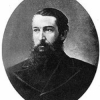Sidney Lanier

Sidney Lanier
Sidney Clopton Lanierwas an American musician, poet and author. He served in the Confederate army, worked on a blockade running ship for which he was imprisoned, taught, worked at a hotel where he gave musical performances, was a church organist, and worked as a lawyer. As a poet he used dialects. He became a flautist and sold poems to publications. He eventually became a university professor and is known for his adaptation of musical meter to poetry. Many schools, other...
NationalityAmerican
ProfessionPoet
Date of Birth3 February 1842
CityMacon, GA
CountryUnited States of America
Out of the woods my Master came, Content with death and shame. When Death and Shame would woo Him last, From under the trees they drew Him last: 'Twas on a tree they slew Him--last When out of the woods He came.
Look out, Death: I am coming.-Art thou not glad? what talks we'll have.-What memories of old battles.-Come, bring the bowl, Death; I am thirsty.
Gradually I find that my whole soul is merging itself into this business of writing, and especially of writing poetry. I am going to try it; and am going to test, in the most rigid way I know, the awful question whether it is my vocation.
Leap through the Mystery of death as the circus-rider leaps through the papered hoop ... find Life ambling along beneath us on the Other Side.
But I cannot bring myself to believe that I was intended for a musician, because it seems so small a business in comparison with other things which, it seems to me, I might do. Question here: 'What is the province of music in the economy of the world?
If a man made himself an expert in any particular branch of human activity, there would result the strong tendency that a peculiar aptitude towards the same branch would be found among some of his descendants.
Into the woods, my Master went, Clean forspent, forspent, Into the woods my Master came, Forspent with love and shame. But the olives they were not blind to Him, The little gray leaves were kind to Him: The thorn-tree had a mind to Him, When into the woods He came.
As the woodpecker taps in a spiral quest From the root to the top of the tree, Then flies to another tree, So have I bored into life to find what lay therein, And now it is time to die, And I will fly to another tree.
Death lieth still in the way of life, Like as a stone in the way of a brook; I will sing against thee, Death, as the brook does, I will make thee into music which does not die.
Ye marshes, how candid and simple and nothing-withholding and free, Ye publish yourselves to the sky and offer yourselves to the sea.
I will fly in the greatness of God as the marsh-hen flies, In the freedom that fills all the space 'twixt the marsh and the skies.
Verse is a set of specially related sounds, repeated aloud.
But Thee, but Thee, O sovereign Seer of time, But Thee, O poets' Poet, Wisdom's Tongue, But Thee, O man's best Man, O love's best Love, O perfect life in perfect labor writ, O all men's Comrade, Servant, King, or Priest, -- What IF or YET, what mole, what flaw, what lapse, What least defect or shadow of defect, What rumor, tattled by an enemy, Of inference loose, what lack of grace Even in torture's grasp, or sleep's, or death's -- Oh, what amiss may I forgive in Thee, Jesus, good Paragon, Thou Crystal Christ?
Out of the hills of Habersham, Down the valleys of Hall, I hurry amain to reach the plain; Run the rapid and leap the fall, Split at the rock, and together again Accept my bed, or narrow or wide, And flee from folly on every side With a lover's pain to attain the plain, Far from the hills of Habersham, Far from the valleys of Hall.